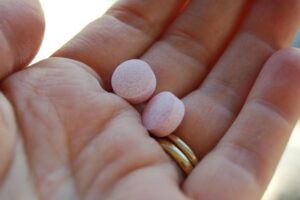What are the chances of getting Pregnant from precum while Ovulating

The Precum and Pregnancy Puzzle: Separating Fact From Fiction
Trying to conceive? Or perhaps you’re worried about an unplanned pregnancy? The question of whether precum (pre-ejaculate fluid) can lead to pregnancy arises frequently. This comprehensive guide dives into the science behind precum and explores the chances of getting pregnant from it, particularly during ovulation.
Demystifying Precum: Understanding the Pre-Ejaculatory Fluid
Precum, also known as pre-ejaculate or pre-seminal fluid, is a clear, slightly sticky liquid released from the penis during sexual arousal. Its primary function is to lubricate the urethra and prepare it for sperm from the semen to pass through.
Key Points About Precum:
- Composition: Precum is primarily composed of fluids from the Cowper’s glands and Littre’s glands, located along the urethra. These fluids contribute to lubrication and maintain a slightly alkaline environment that can neutralize vaginal acidity and potentially enhance sperm motility (movement).
- Sperm Content: While some studies suggest precum might occasionally contain a small number of sperm, especially if ejaculation recently occurred, the majority of precum samples do not contain any sperm.
Important Note: The presence and quantity of sperm in precum can vary significantly between individuals and depend on factors like time since last ejaculation.
The Ovulation Equation: Understanding the Fertile Window
For pregnancy to occur, sperm needs to meet and fertilize an egg. A woman’s most fertile window, the time when pregnancy is most likely, is during ovulation. Ovulation typically occurs around the middle of the menstrual cycle, roughly 14 days before the next expected period.
Factors Influencing Fertile Window:
- Menstrual Cycle Length: The fertile window can vary depending on a woman’s individual menstrual cycle length.
- Ovulation Timing: Ovulation doesn’t always occur precisely on day 14. Factors like stress or hormonal fluctuations can cause slight variations.
Tracking Your Cycle: Utilizing ovulation predictor kits or basal body temperature tracking can help you identify your fertile window and understand your most likely ovulation days.
Precum and Pregnancy: Weighing the Odds
Now let’s address the crucial question: can precum lead to pregnancy? Here’s a breakdown of the factors involved:
- Sperm Content: As mentioned earlier, most precum samples don’t contain sperm. However, the occasional presence of a small number of sperm is a possibility, particularly if ejaculation recently occurred.
- Sperm Viability: Even if sperm are present in precum, their viability (ability to fertilize an egg) is questionable. Precum is not designed to support sperm and might contain substances that could reduce sperm motility and lifespan.
- Ovulation Timing: For pregnancy to occur, sperm needs to be present in the fallopian tubes when ovulation releases an egg. Precum released during intercourse might not contain enough viable sperm to reach the egg in time, especially if ovulation hasn’t yet occurred.
While a very low chance exists, it’s not impossible for pregnancy to occur from precum, particularly during ovulation. However, the likelihood is significantly lower compared to pregnancy resulting from unprotected intercourse with ejaculation.
Enhancing SEO with Visuals: Including an infographic illustrating the menstrual cycle with highlighted fertile window and sperm viability timeline can significantly enhance user engagement and understanding.
Beyond the Basics: Addressing Precum and Pregnancy Concerns
Let’s delve into some frequently asked questions (FAQs) to provide further clarity:
-
Q: What are the risk factors for getting pregnant from precum?
- A: The primary risk factors include:
- Recent ejaculation (increasing the chance of sperm being present in precum).
- Irregular ovulation cycles (making it harder to pinpoint the fertile window).
- Having a high sperm count (potentially increasing the chance of viable sperm in precum).
- A: The primary risk factors include:
-
Q: If I’m concerned about pregnancy from precum, what can I do?
- A: If you’re worried about an unplanned pregnancy, consider emergency contraception (the morning-after pill). It’s most effective when taken within 72 hours of unprotected intercourse, including potential exposure from precum.
- A more reliable approach is to utilize effective birth control methods like condoms, birth control pills, or IUDs to prevent pregnancy altogether.
-
Q: I’m trying to conceive. Can using precum help?
- A: While some believe precum might enhance sperm motility, there’s no scientific evidence to support this claim. If you’re trying to conceive, focus on practices that promote healthy sperm production and consult a doctor if you have any concerns about fertility.



